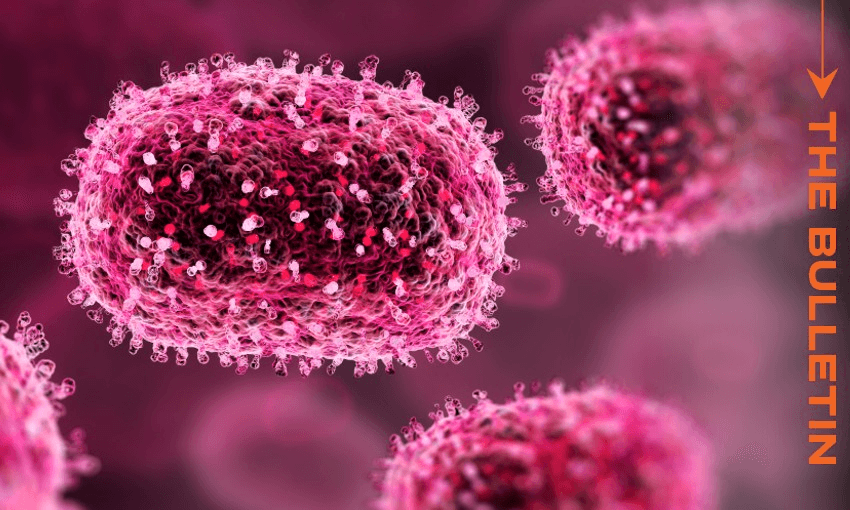Two new cases have been confirmed and the green light has now been given for easier vaccine access, writes Stewart Sowman-Lund in today’s extract from The Bulletin.
To receive The Bulletin in your inbox every weekday morning, sign up here.
Two cases confirmed, more likely
Mpox, once called monkeypox, is back in the country. There are now two confirmed cases, both with links to the Winter Pride Festival in Queenstown. And as with any infectious disease, there could be more to come. But while the arrival (or in this case, the return) of mpox may instantly bring back unwanted thoughts of the Covid-19 pandemic, we’re unlikely to see any of the widespread health measures from that period reinstated. As microbiologist Siouxsie Wiles explained in a 2022 piece for The Spinoff, “elimination [of mpox cases] means getting at risk people vaccinated, making it easy for people to get tested and to self-isolate, and using contact tracing to break any chains of transmission”.
But the question is, are we doing any of that sufficiently? While the virus, wrote RNZ’s Katie Kenny, isn’t the “new Covid”, that doesn’t mean it should be ignored. Contracting mpox, which is primarily spread through close contact, can cause flu-like symptoms and painful rashes, and can still be fatal, though the mortality rate is relatively low. It is especially dangerous for immunocompromised people. So what’s being done to stop its spread, and should we be doing more?
A global outbreak
First, some context. As mentioned, this isn’t the first time mpox has been detected in New Zealand. Since 2022, there have been 55 cases of the “clade 2” variant of mpox in New Zealand. An outbreak of the more severe clade 1 variant in multiple African nations prompted the World Health Organisation to declare it a global health emergency in August, the second time it has made that call since 2022. The new cases detected in Queenstown are unrelated to that outbreak, reported RNZ’s Samuel Robinson, meaning the risk of a widespread outbreak still remains low. No cases of clade 1 have been detected in New Zealand or neighbouring nations.
In the Democratic Republic of Congo, reported NPR, there have been more than 20,000 suspected cases of the virus this year, causing hundreds of deaths as health workers plea for further shipments of vaccine. That outbreak has other countries on high alert. The United States is preparing for the clade 1 variant to arrive, while cases have been detected in disparate countries like Thailand and Sweden.
Wider access to vaccine confirmed
Mpox affects primarily, but not exclusively, gay, bisexual and other men who have sex with men. As Wiles noted in her 2022 piece, “stigma and prejudice surrounding homosexuality can stop people seeking a test or treatment, getting vaccinated, or self-isolating if they need to”. But that can be easier said the done. The Post’s Rachel Thomas reported this week that the wait time for a vaccination in Wellington was 10 months, unless people pay $85 to be seen faster. “I thought [that] was a really large amount for a preventative vaccine and a little bit outside my means,” said a concerned member of the public.
In welcome news for those seeking the vaccine, the government confirmed yesterday it would make it easier for people to access it. Since last year, explained Thomas in a follow-up report, the mpox vaccine has been administered under a special provision in the Medicines Act. However, it had not been given Medsafe approval and so could not be promoted and nor could it be given without a detailed consultation with the patient. Associate health minister David Seymour said Medsafe had now given provisional approval for the vaccine and established an advisory group to determine which groups were at greatest risk.
What else can we be doing?
Edwin Reynolds, medical advisor at the Immunisation Advisory Centre, in comments to the Science Media Centre, said that wider access to the vaccine was welcome. “The mpox vaccine is being delivered to the most at-risk via sexual health clinics but this announcement means other providers will be able to access the vaccine for their patients,” he said.
But while that will assist with controlling the current outbreak here, professor Michael Baker believed we should be doing more to assist other countries. With the nastier clade 1 variant spreading rapidly, it may only be a matter of time before it arrives here. “Aotearoa New Zealand should also review its overseas aid contribution and support for programmes that could assist prevention and control of the severe mpox epidemic in Africa,” Baker said.
